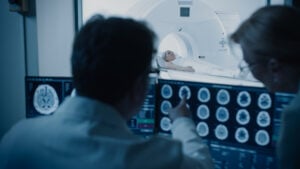People have debated over centuries whether or not it’s possible to die of a broken heart. The good news is that if the type of broken heart you’re referring to is stress cardiomyopathy, then it’s highly unlikely.
Also referred to as Tako-Tsubo cardiomyopathy and Apical ballooning syndrome, it’s when the heart muscle quickly weakens, disrupting the heart’s pumping action. This is usually the result of stress – either physical or emotional. Having said that, doctors report that up to around one-third of people who experience the condition (which was only recognised in 1990) experience no stress at all.
What happens in broken heart syndrome?
A surge of stress hormones is produced when you are grieving or experiencing a shock, which floods your system. These are accompanied by proteins adrenaline and noradrenaline. This sudden flooding of adrenalin can cause the small arteries to narrow. As a result, there is a sudden drop in blood flow to the heart. Or, the adrenalin binds to the heart cells, causing calcium to enter them and prevent the heart from beating as normal.
What is octopus heart?
Interestingly, the condition is sometimes called Octopus Heart, especially in Japan, where the expression was first coined. That’s because cardiologists in Japan discovered that the condition caused the walls of the heart’s left ventricle to change shape.
The ventricle develops a narrow neck and a round bottom, similar to the tako-tsubo octopus pot used by Japanese fishermen.
Is broken heart syndrome reversible?
The condition is unlikely to be fatal – most people’s heart recovers within weeks or even days of a stress cardiomyopathy event. It is only life-threatening if it contributes to other existing conditions, such as heart failure, heart rhythm abnormalities, and low blood pressure.
Broken heart syndrome may mimic the symptoms of a heart attack in terms of chest pain, feeling dizzy, sweating and having shortness of breath, but stress cardiomyopathy is entirely different. It isn’t, for instance, the result of a blockage or blood clot in the coronary arteries where, if this lasts long enough, it causes scar tissue and irreversible damage to the heart. Instead, broken heart syndrome results from a flood of adrenalin which, when it calms down, doesn’t leave any permanent heart damage.
Causes of broken heart syndrome
In addition to grief and shock, other emotional stressors of the condition include anger, surprise and fear. Physical illnesses include seizures, fevers, asthma attacks and low blood sugar. Stress cardiomyopathy has also been known to occur in some cases post-surgery.
Kevin Bybee, MD, an associate professor of medicine at the University of Missouri-Kansas City School of Medicine, says he diagnoses up to 10 cases of Stress cardiomyopathy every month. He has attributed it to critical events such as the death of a spouse or a severe car accident. But he has also seen patients diagnosed with it after losing money in a casino and having to speak in front of a large audience.
Patients most at risk
According to medical studies, middle-aged women (aged 55 and over) and probably post-menopausal are five times more likely to experience the condition. This is because a woman’s oestrogen levels decline as they age, making them more vulnerable to the effect of a sudden stressful event. People of both sexes, including children prone to anxiety and depression, can also be prone to the condition.
Research from Cedars-Sinai implies the condition is on the rise. Susan Cheng, MD, lead author of a study published in the Journal of the American Heart Association, says that between 2006-2017 when the research was carried out, women ages 50 to 74 had the greatest rate of increase in the condition. However, she says more research is definitely needed:
While doctors are more aware of the condition now, it's not just the increased recognition. There is something going on driving the continual increase. It probably has something to do with environmental changes.
Susan Cheng, MD
Treatments
To prevent another occurrence of the condition, beta-blockers are sometimes prescribed by a Cardiologist – especially for those individuals who suffer from chronic stress.
An echocardiogram is often given at around six weeks to check that the heart has fully recovered after a ‘broken heart’ incident.
If you are experiencing any chest pain or related heart symptoms, please seek immediate attention from your local cardiologist.
About MTM Global
MTM Global is a UK-based international healthcare consultancy and online travel agency specializing in premier health tourism.
For all corporate and media inquiries, click here.














